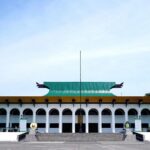DAVAO CITY (MindaNews / 10 January) – Former President Rodrigo Duterte sees no reason why the 1987 Constitution should be changed because “we have a good Constitution. I find it in perfect condition. There is absolutely nothing wrong with it,” he said.
He told reporters on Saturday night that he is not for amending the Constitution and had asked his political party for a meeting to make a stand on the reported moves for Charter Change (Cha-Cha).
It is this same Constitution that Duterte wanted changed when he was President from 2016 to 2022, to transform the system of government in the country from presidential to federal. He said his administration’s proposed shift was “not to perpetuate myself in power or to extend the term of office because you’re only limited to one. Nothing of that sort.”
He said the purpose of his administration in changing the Constitution was “a little bit higher, a noble one.”
There are three ways to amend the Constitution: members of Congress convert into a Constituent Assembly (CA) upon a vote of ¾ of all its members; Congress, by a vote of two-thirds of all its members, can call a constitutional convention (ConCon), or by a majority vote of all its members, submit to the electorate the question of calling such a convention; and a people’s initiative (PI) upon a petition of at least 12% of the total number of registered voters, of which every legislative district must be represented by at least 3% of the registered voters therein.
At the Philippine Economic Forum in Iloilo last month, Speaker Martin Romualdez, said the will “highly recommend that we embark on a people-centered initiative” to cure the procedural probem on how the House and Senate should vote on proposals to amend the Constitution.
“I hope that we can undertake this as soon as possible so we could have some clarity on the procedures. We’d like to have that resolved by and through a people’s initiative,” he said.
On Tuesday, January 9, television networks aired advertisements pushing for a People’s Initiative to amend the Constitution, claiming several sectors were excluded and that the promised reforms in agriculture, education and the economy failed.
ABS-CBN reported that PIRMA (People’s Initiative for Reform Modernization and Action) which sought to amend the Constitution through PI during the Ramos administration, was behind the advertisement, according to the Gana Atienza Avisado Law Offices, which represents the group.
The network quoted lawyer Alex Avisado as saying the purpose of the advertisement was for the public to discuss if this is the right time to amend the Constitution and what amendments are they proposing.
At the start of Duterte’s administration in 2016, there were moves to amend the Constitution through a CA or through a ConCon.
Duterte issued Executive Order No. 10 on December 7, 2016 creating a 25-member Consultative Committee (ConCom) that would study, conduct consultations, and review the 1987 Constitution“including, but not limited to, the provisions on the structure and powers of the government, local governance, and economic policies” and submit its report, recommendations and proposal to the President within six months.
Duterte, however, appointed members ot the ConCom only in January 2018.
On July 9 that year, the ConCom led by its chair, retired Chief Justice Reynato Puno, submitted its proposed Federal Constitution to Duterte.
“In drafting this proposed Constitution, we were guided by one directive you gave — do what is best for our people,” Puno said. The ConCom proposed the creation of 18 federated regions, including federated regions of the Bangsamoro and Cordillera, provided for a self-executing ban on political dynasties, political party development and electoral reforms.
“The design of this bayanihan federalism installs a federal government strong enough to hold together the various federated regions and establishes regions that are socially, economically, and politically viable and sustainable,” Puno said.
But the shift to federalism under the Duterte administration failed.
Duterte claimed it failed “because it was always suspect. It was fraught with suspicion” that it was a scheme to perpetuate themselves in power.
Writing for the East Asia Forum in July 2019, political scientist Julio Teehankee of the De La Salle University, noted that while speculation was rife that “a big push for a federal form of government would finally gain traction” after Duterte’s allies won big in the May 2019 midterm polls, “this speculation was quashed by no less than Duterte himself who publicly declared, ‘If you do not want federalism, fine, but change the constitution that would change this nation.’”
Their intent, Duterte stressed last Saturday, was “noble,” to change the system of government and not to perpetuate themselves in power. (Carolyn O. Arguillas / MindaNews)



